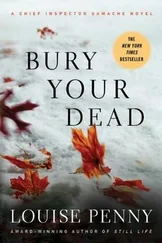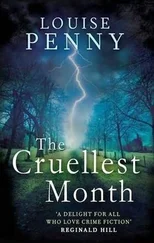After slipping it into his pocket, Gamache searched the cell and in the wastepaper basket he found a note.
Take as needed . And a signature. He carefully folded the paper, with more precision than necessary. Pausing at the window, he stared into the fog.
Yes. It was lifting.
* * *
In the infirmary Frère Charles was doing his paperwork and checking on Beauvoir every few minutes. The shallow, rapid breathing had become regular. Deeper. The Sûreté Inspector had moved from being passed out to merely sleeping.
He’d wake up in an hour or so, with a headache, a thirst, and a craving.
Frère Charles didn’t envy this man.
The monk looked up and started. Armand Gamache was standing just inside the doorway. And as Frère Charles watched, the Chief Inspector slowly closed the door.
“Did you find it?” the doctor asked. The Chief was looking at him in a way that the monk didn’t like.
“I did. Under his pillow.”
Frère Charles held out his hand for the bottle, but Gamache didn’t move. He just continued to stare and the monk dropped his eyes, no longer able to hold the hard, heavy stare.
“I also found this.” Gamache held the note up and the monk went to take it, but the Chief pulled it back. Frère Charles read it as it hung in the air between them, then met the Chief Inspector’s eyes.
The monk’s mouth was open, but no words came out. His face turned a deep red and he looked again at the note in Gamache’s hand.
It was in his own handwriting. With his own signature.
“But I didn’t…” he tried again and flushed more.
Chief Inspector Gamache lowered the paper and walked over to Beauvoir. There he laid his hand against his Inspector’s neck, to feel his pulse. It was, the doctor recognized, a practiced move. A natural move. For the head of homicide. To establish proof of life. Or death.
Then Gamache turned back to the doctor.
“Is this your handwriting?” he nodded to the note.
“Yes, but—”
“And your signature?”
“Yes, but—”
“Did you give Inspector Beauvoir these pills?”
Gamache reached into his pocket and held out the pills, using the handkerchief.
“No. I never gave him pills. Let me see.” The doctor reached but Gamache withdrew the bottle, so that the doctor had to lean in to read the label.
After examining it he turned and walked to his medicine cabinet, which he unlocked using a key in his pocket.
“I keep OxyContin in stock, but only for the worst emergencies. I’d never normally prescribe it. Filthy stuff. All my stock checks out. I have the records if you’d like to see what I’ve ordered, when, and what I’ve prescribed. There’s none missing.”
“Records can be faked.”
The doctor nodded and handed a small pill bottle to the Chief, who put on his glasses and examined it.
“As you see, Chief Inspector, the pills are the same, but the dosage and the supplier is different. I never deal in the higher doses and we get our medications from a medical supply house in Drummondville.”
Gamache removed his glasses. “Can you explain the note?”
Both men looked again at the paper in Gamache’s hand.
Take as needed . And then the doctor’s signature.
“I must’ve written that for someone else, and whoever left the OxyContin for your Inspector found it and used it.”
“Who have you prescribed for recently?”
The doctor went to his records, but both men knew this wasn’t necessary. It was a small enough community, and this would have been recent enough. Frère Charles almost certainly would remember, without aid of records.
But still, he looked it up and returned.
“I should demand a warrant for medical records,” he said, but they both knew he wouldn’t. It would just be postponing the inevitable and neither man wanted that. Besides, the monk never again wanted to experience that cold, hard stare.
“It was the abbot. Dom Philippe.”
“ Merci .” Gamache went over to Beauvoir once again and looked down at the face of his now-sleeping Inspector. After tucking the blanket snug around him, the Chief walked to the door. “Can you tell me what the prescription was for?”
“A mild tranquillizer. The abbot hasn’t slept well since the death of Frère Mathieu. He needed to function, so he came for help.”
“Have you ever prescribed tranquillizers for him before?”
“No, never.”
“And for the other brothers? Tranquillizers? Sleeping pills? Pain medication?”
“It happens, but I watch it closely.”
“Do you know if the abbot used the tranquillizers?”
The doctor shook his head. “No, I don’t. I doubt it. He prefers meditation to medication. We all do. But he wanted something, just in case. I wrote that note for him.”
* * *
Armand Gamache reached the Blessed Chapel but instead of walking through it, he paused. And sat, in the very last pew. Not to pray, but to think.
If the doctor was telling the truth, his note was found by someone and used to give Beauvoir the impression the pills were from the medical monk. Gamache wished he could convince himself that Beauvoir didn’t know what he was taking, but the bottle was clearly marked OxyContin.
Beauvoir knew. And he took them anyway. No one forced him. But someone had tempted him. Gamache looked at the altar, which had changed in just the few minutes he’d been sitting there. Strings of light were dropping, like luminous acrobats, from above.
The fog was clearing. The boatman would come for them. Gamache checked his watch. In two and a half hours. Did he have time to do what was needed? The Chief Inspector spotted someone else in the chapel, sitting quietly in a pew by the wall. Not, perhaps, trying to hide. But not sitting out in the open either.
It was the Dominican. Sitting in the reflected light. A book on his knees.
And in that moment, the Chief Inspector knew, with distaste, what he had to do.
* * *
Jean-Guy Beauvoir was aware of his mouth before anything else. It was huge. And lined with fur and mud. He opened and closed it. The sound was mammoth. A mushy, clicking sound, like his grandfather in later years, eating.
Then he listened to his breathing. It was also unnaturally loud.
And finally, he pried open one eye. The other seemed glued shut. Through the slit he saw Gamache sitting on a hard chair, pulled up to the bed.
Beauvoir felt a moment of panic. What had happened? The last time he saw the Chief sitting like that Beauvoir had been gravely, almost mortally, wounded. Had it happened again?
But he didn’t think so. This felt different. He was exhausted, almost numb. But not in pain. Though there was an ache, deep down.
He watched Gamache sitting so still. His glasses were on, and he was reading. The last time, in the Montréal hospital, Gamache had also been hurt. His face a shock to Beauvoir when he’d finally roused enough to take anything in.
It had been covered in bruises, and there was a bandage over the Chief’s forehead. And when he got up to lean over Beauvoir, Jean-Guy had seen the grimace of pain. Before it quickly turned into a smile.
“All right, son?” he’d asked, quietly.
Beauvoir couldn’t talk. He’d felt himself drifting off again, but he held those deep, brown eyes as long as he could, before he had to let go.
Now, in the monastery infirmary, he watched the Chief.
He was no longer bruised, and while there was and always would be a deep scar over his left temple, it had healed. The Chief had healed.
Beauvoir hadn’t.
In fact, it now seemed to Beauvoir that the healthier the Chief got, the weaker he himself became. As though Francoeur was right, and Gamache was sucking him dry. Using him until he could be discarded. In favor of Isabelle Lacoste, whom the Chief had just promoted to Beauvoir’s own rank.
Читать дальше











